KBKO international
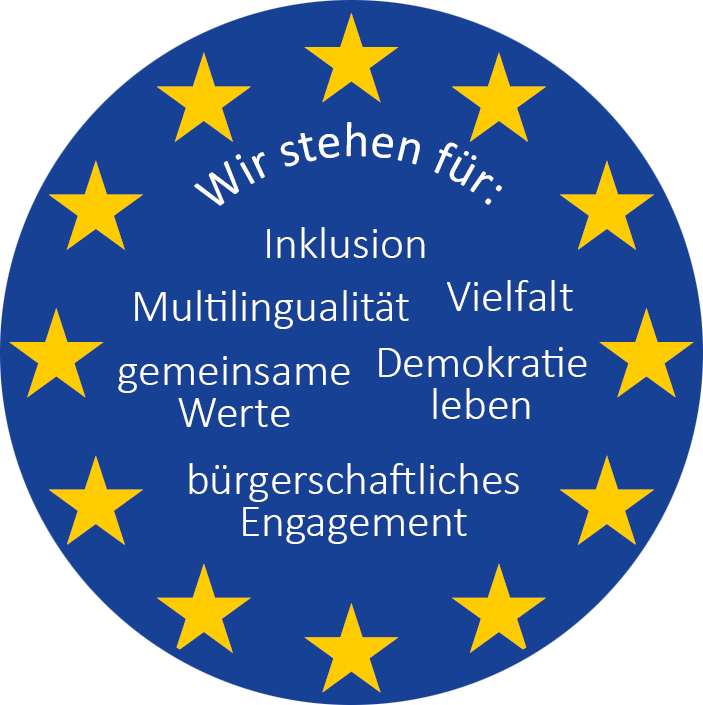
Das KBKO versteht sich als international ausgerichtete Schule und hat das Bestreben, die Lernenden optimal auf das Leben und Arbeiten in einer globalisierten Welt vorzubereiten. Gute Fremdsprachenkenntnisse, interkulturelle Kompetenz und Auslandserfahrung gewinnen auf den europäischen Arbeitsmärkten und darüber hinaus immer mehr an Bedeutung. Um den daraus entstehenden Anforderungen für Bildungseinrichtungen gerecht zu werden, verfügt das Berufskolleg bereits über ein breites Portfolio an fremdsprachlichen Unterrichts- und Differenzierungsangeboten, Auslandspraktika und internationalen Austauschprojekten. Um dieses Angebot noch zu erweitern und somit die Teilnahme möglichst vieler Schülerinnen und Schüler an Auslandsaktivitäten zu ermöglichen, befindet sich das KBKO aktuell im Akkreditierungsprozess für die Antragsrunde 2021-2027 des EU-Förderprogrammes Erasmus+.
Ansprechpartner aus dem Team International sind die EU-Koordinator*innen Ute Schmidt, Katrin Winkel und Holger Scheel.
Kontakt: international@kbko.de
Abgesehen vom Fach Englisch, das lehrplangemäß in allen Bildungsgängen unterrichtet wird, bietet das KBKO im Differenzierungsbereich der Vollzeitbildungsgänge weitere fremdsprachliche Fächer an.
Im Wirtschaftsgymnasium wird Spanisch als zweite Fremdsprache von Jahrgangsstufe 11 bis 13 unterrichtet. In der Höheren Handelsschule stehen Spanisch und Russisch als Differenzierungskurse zur Wahl. Bildungsgangübergreifend (Gymnasium und Höhere Handelsschule) kann außerdem der Differenzierungskurs European Studies gewählt werden, welcher in englischer Sprache unterrichtet wird und inhaltlich den Fokus auf EU-Politik, geschichtliche Hintergründe und aktuelle gesellschaftliche Themen legt.
In Zusammenarbeit mit dem ADC College Dublin organisiert das KBKO jedes Jahr Praktikumsprogramme in Irland. Der dreiwöchige Aufenthalt in der irischen Hauptstadt gliedert sichin einen 5-tätigen Sprachkurs in Business English gefolgt von zwei Wochen intensivem Praktikum im Bereich Wirtschaft und Verwaltung bei einem irischen Unternehmen. Diese vielfältigen Erfahrungen tragen zur persönlichen und beruflichen Entwicklung der Schülerinnen und Schüler bei. Die Finanzierung des Projektes wird durch EU-Fördermittel und den Förderverein des KBKO umfangreich unterstützt. Das Angebot richtet sich vorrangig an Auszubildende aus der Berufsschule, steht aber auch für Lernende der Höheren Handelsschule und des Wirtschaftsgymnasiums zur Verfügung.
Aktuell befinden sich die teilnehmenden Schülerinnen und Schüler des KBKO in den finalen Vorbereitungen für die diesjährige Dublin-Fahrt, die vom 01. bis zum 21. Oktober 2023 stattfinden wird. Perspektivisch ist geplant, in naher Zukunft auch Praktikumsprogramme in Athen anzubieten.
Ansprechpartnerin: Ute Schmidt
Bericht zur Dublin-Fahrt 2022
Bericht zum Schüleraustausch 2022 mit der Ste. Genevieve High School
Darüber hinaus ist eine Foto-Story auf unserem Instagram-Profil zu finden.
Digital And Distance: Erasmus+ Project „Learn And Earn” Ends Under Corona Conditions
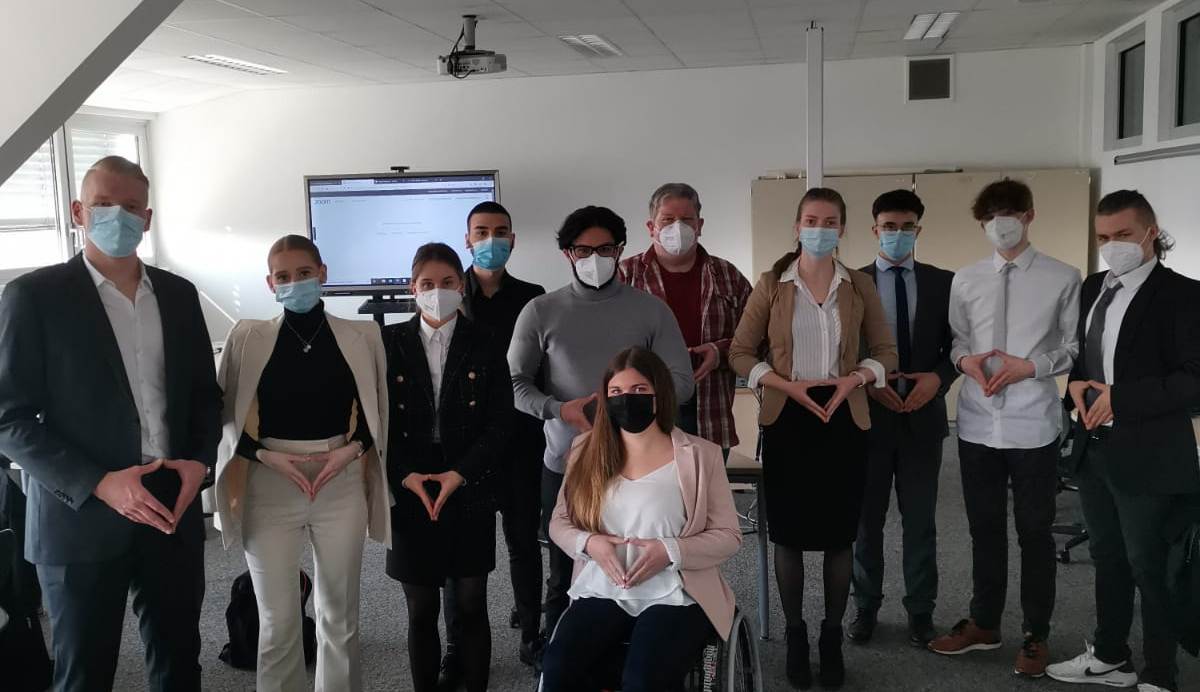
"See you next time in Portugal“ – those were the hopes and expectations when students and teachers said farewell to each other at the end of their meeting in Malta in December 2019. After a week of close cooperation and dealing with topics like entrepreneurship and starting up a business with our project partners in Italy, Malta and Portugal we were all happy to looking forward to continuing our work and meeting again a couple of months later with our Portuguese partners in Fatima. Three meetings in Catania (Italy), Gummersbach and Paola (Malta) had already taken place during which students and teachers not only became more and more familiar with the topic of starting up a business but also intensified personal relationships and even friendships with their foreign partners. No wonder everyone was keen on continuing the project again at last meeting which was scheduled for May 2020 in Fatima (Portugal).
Well, at least we thought we would. But then a tiny virus invisible to the human eye turned out to be a real game changer. The corona bug made it impossible to fly to Portugal and continue our project with our European friends. Not only were we unable to go abroad, even here at home terms like “home office” or “distance learning” became unexpected features of our everyday life in school instead. In contrast to presenting business ideas to our fellow partners we sat at home and created a digital diary dealing with the question “What did I do during the pandemic”. The only comfort in this was the fact that it showed we were all more or less in the same situation, no matter which country we lived in. A sort of ‘common experience’ in Europe, but certainly one we would have rather escaped.
When lessons returned to a rather normal proceeding after the summer holidays there was at least some hope we could re-schedule our postponed meeting, but things were getting worse over the autumn period. Even when here in Gummersbach lessons were still held in presence, our partners in Italy for example were facing a hard lockdown with widespread school closures. As it was clear that we had to finish the project by the end of this term it became more and more obvious that a physical meeting in Portugal was out of question. So it became true for the “Learn And Earn”-project what we already had experienced in our everyday life for a couple of months: Switch on your device and meet online with those you want to see.
And that’s what we did for three days in the week before the Easter holidays: As the GY13A and B were both classes preparing for their final exams, the North Rine-Westphalian state government allowed them to assemble again in presence. And that’s what we did: We met in room 408, high above the roofs of Gummersbach and in front of a big screen which connected us with our friends. So we started our presentation from the screen into the camera out of a classroom, while our friends abroad still were subject to home schooling and granting us a look into their living rooms at home.
Thanks again to Hélia and her Portuguese colleagues for this well organized online meeting. I think we all made the best of it, though not being able to meet physically, we again got in touch with each other, and that’s what counts above all. Or, as one member of the German group put it: “Three days in room 408 were quite okay, but seven days in Portugal would have been better.” He is right. But at least we were able to get in contact again.
This “Learn & Earn”-project has now come to an end. But how successful it was in building friendships is underlined by some participants’ intention: “Let’s keep in touch”. I suppose we will.
Mit Erasmus+ nach Malta
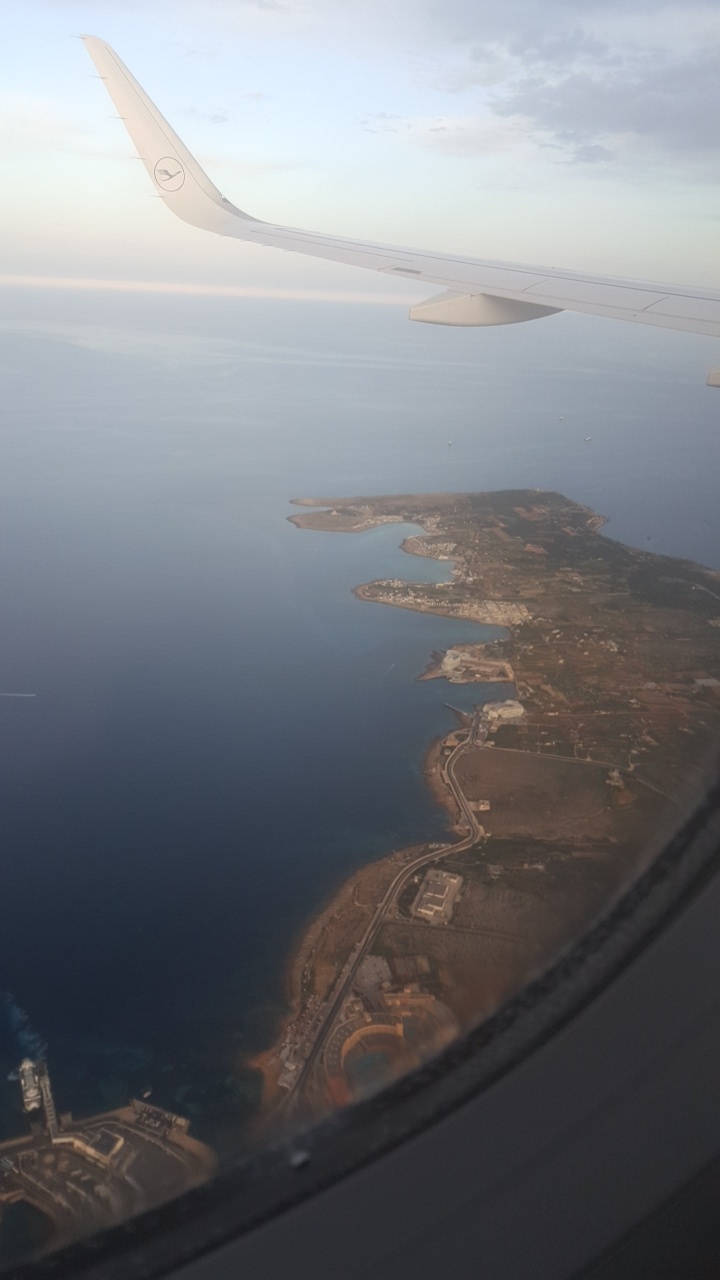
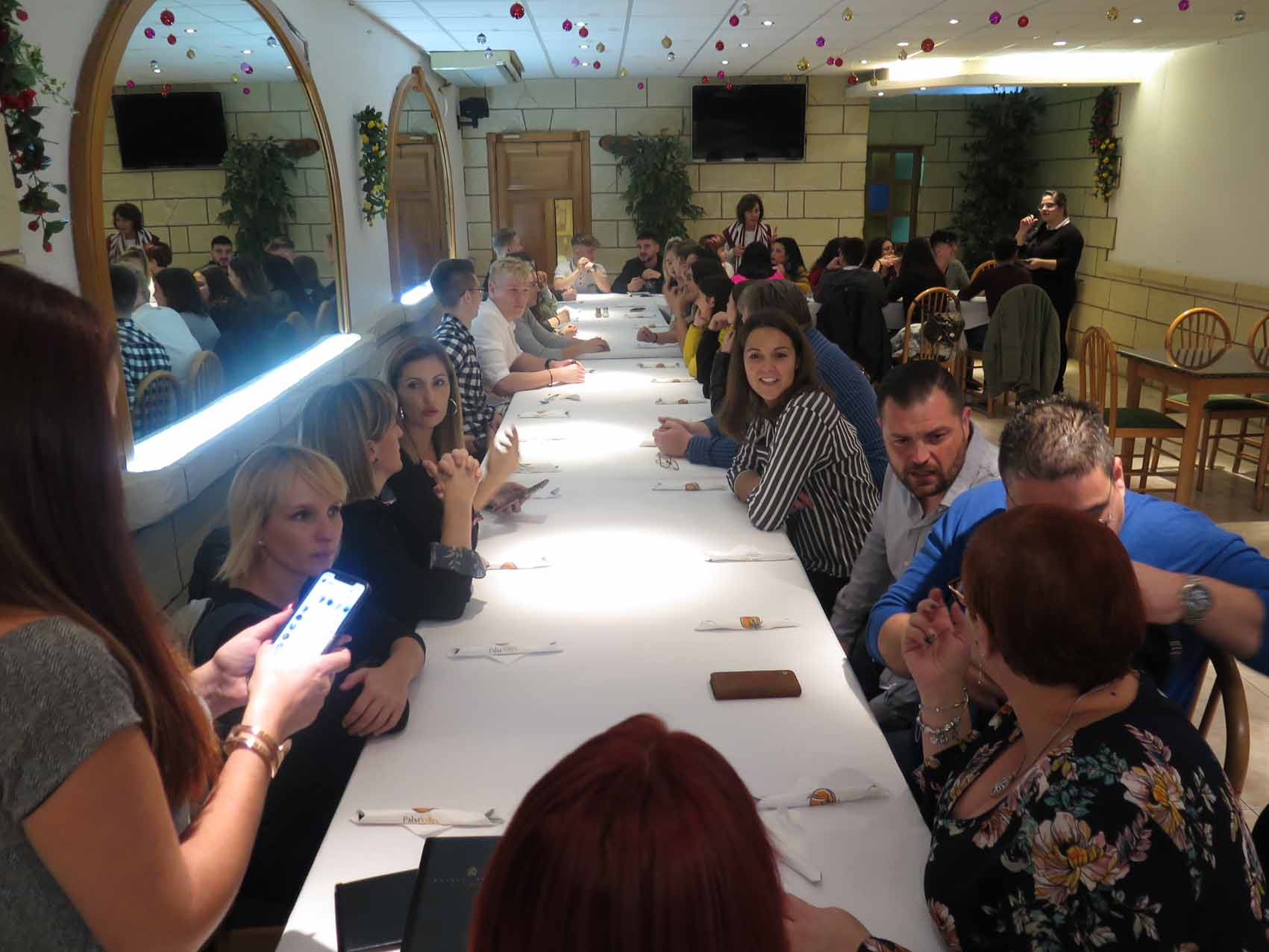
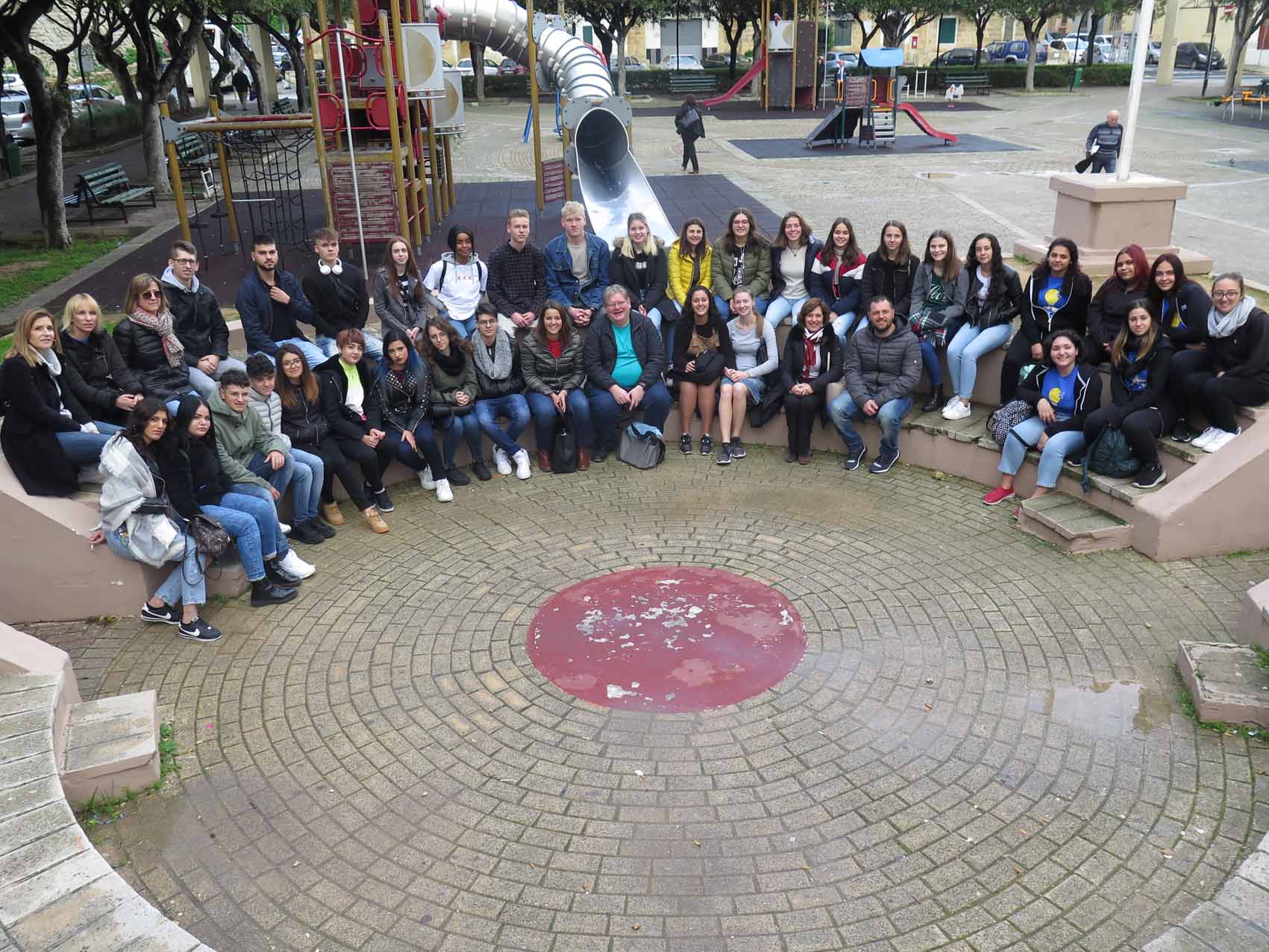
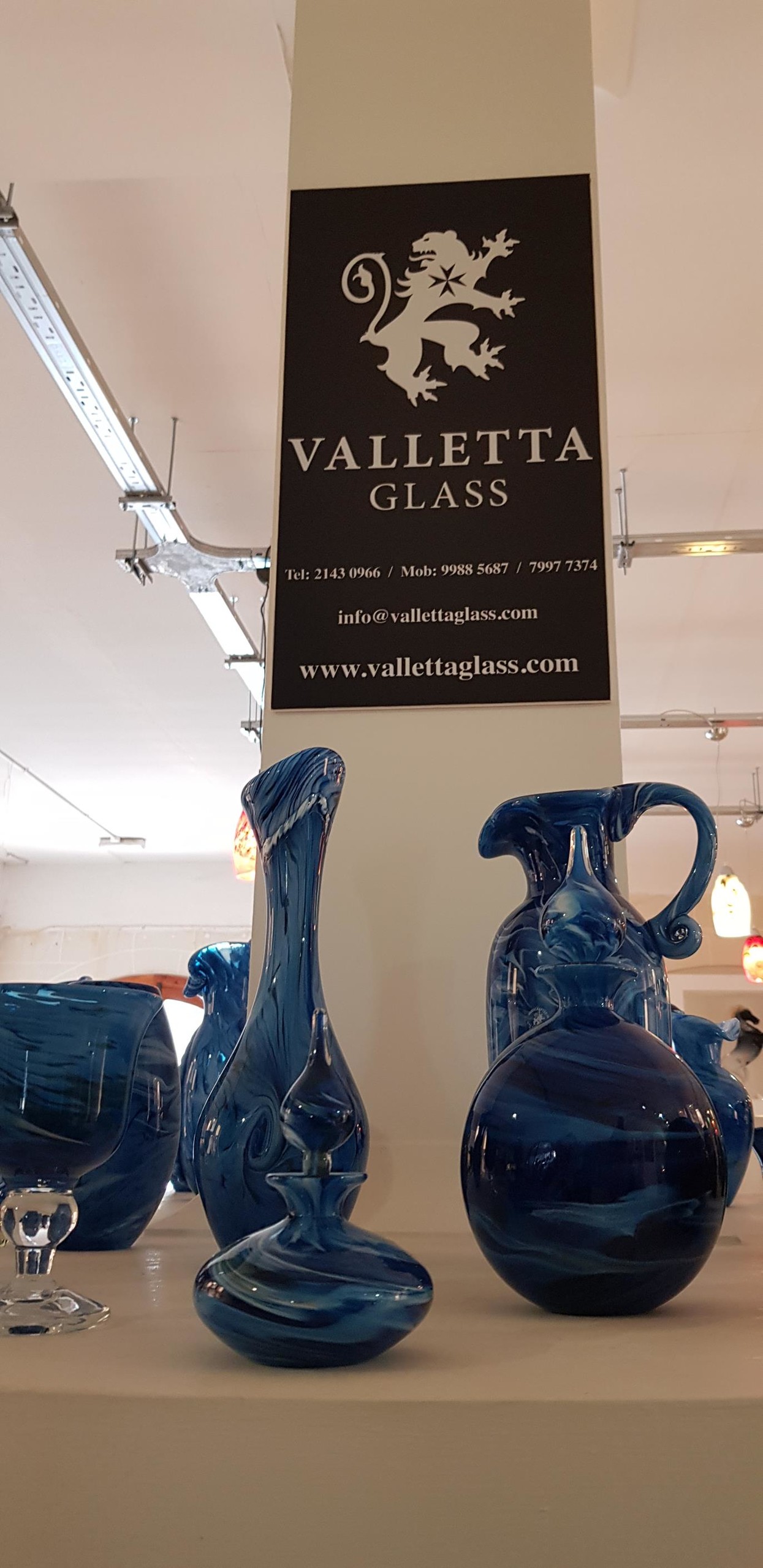
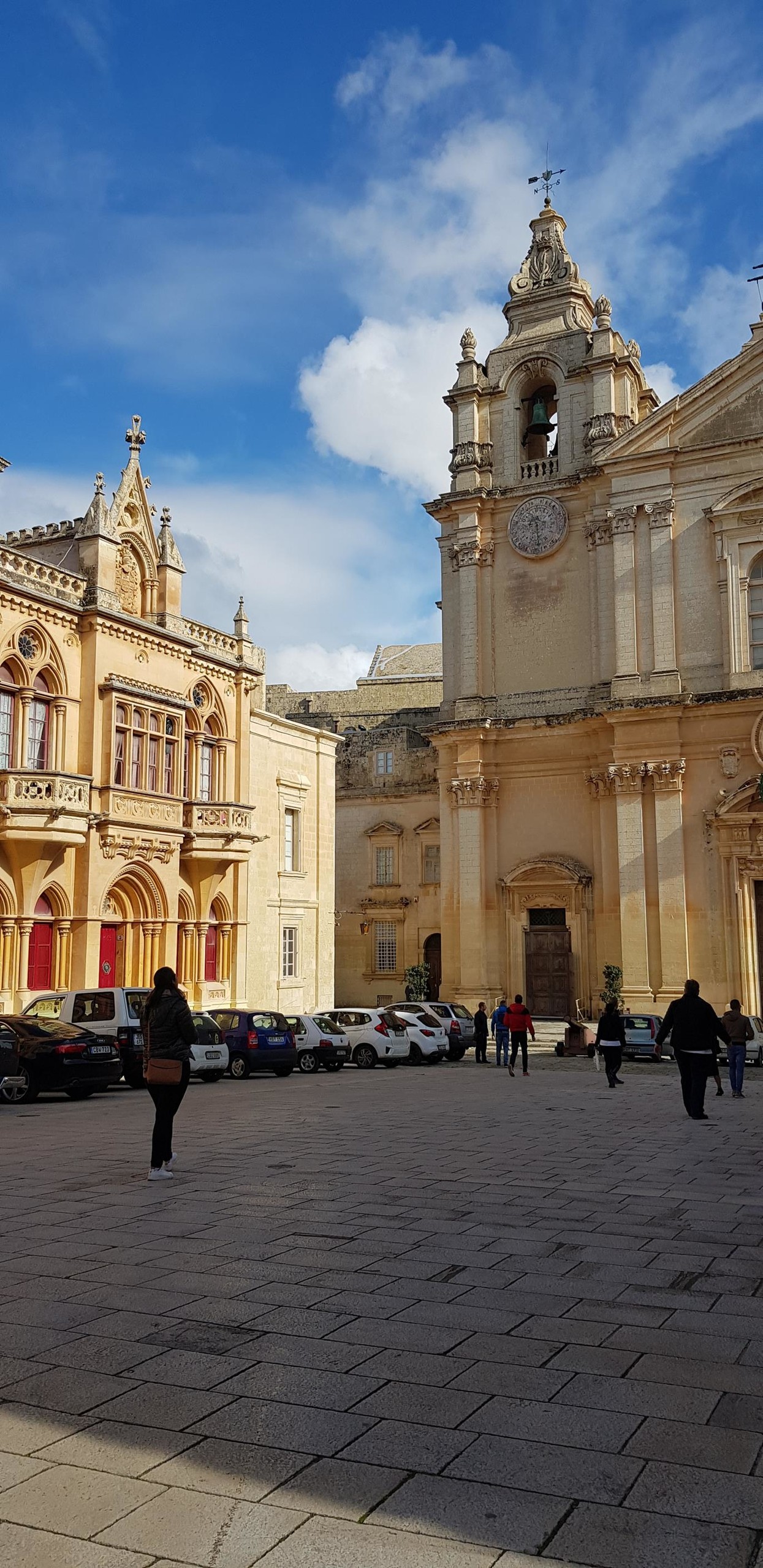
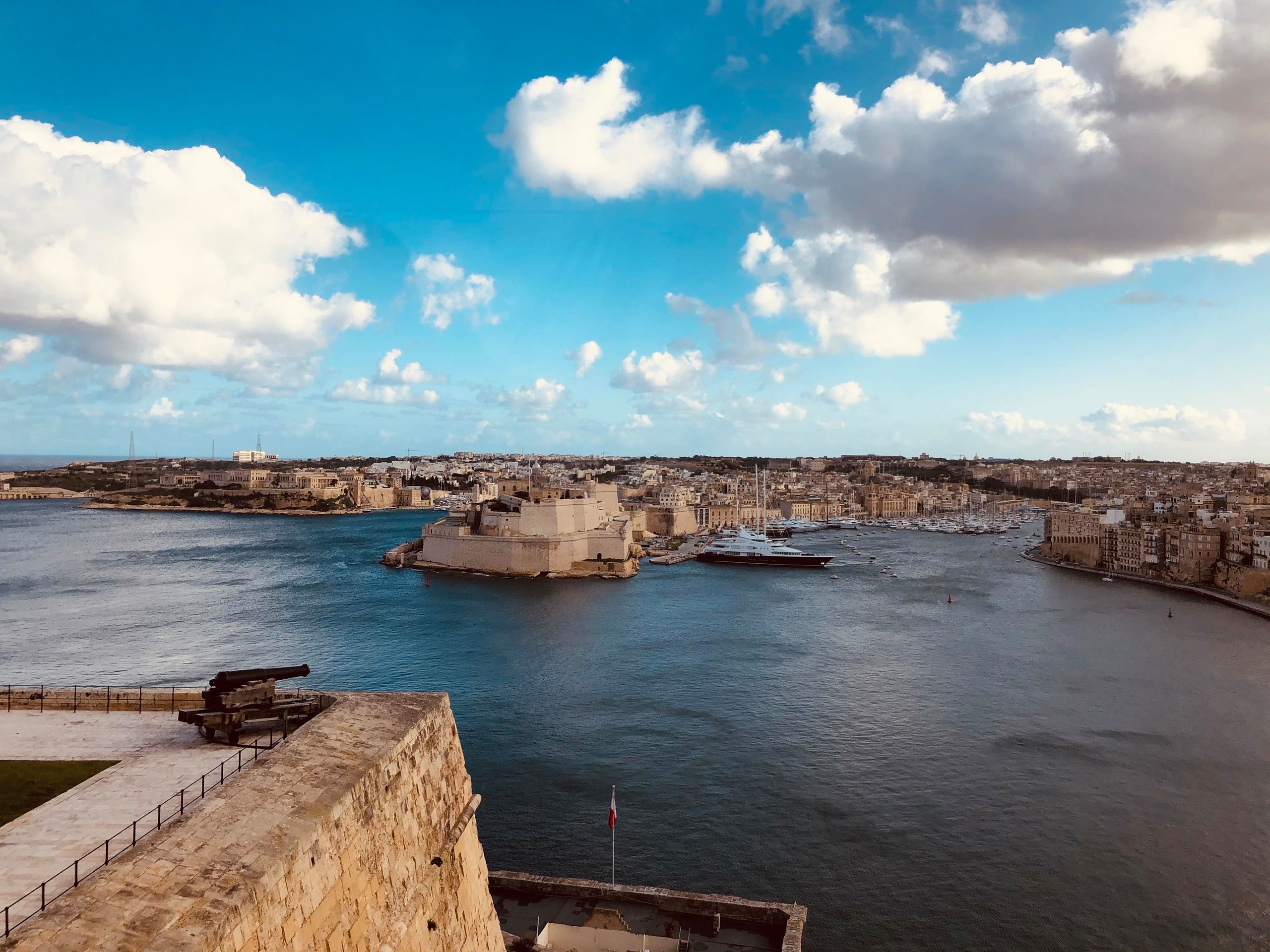
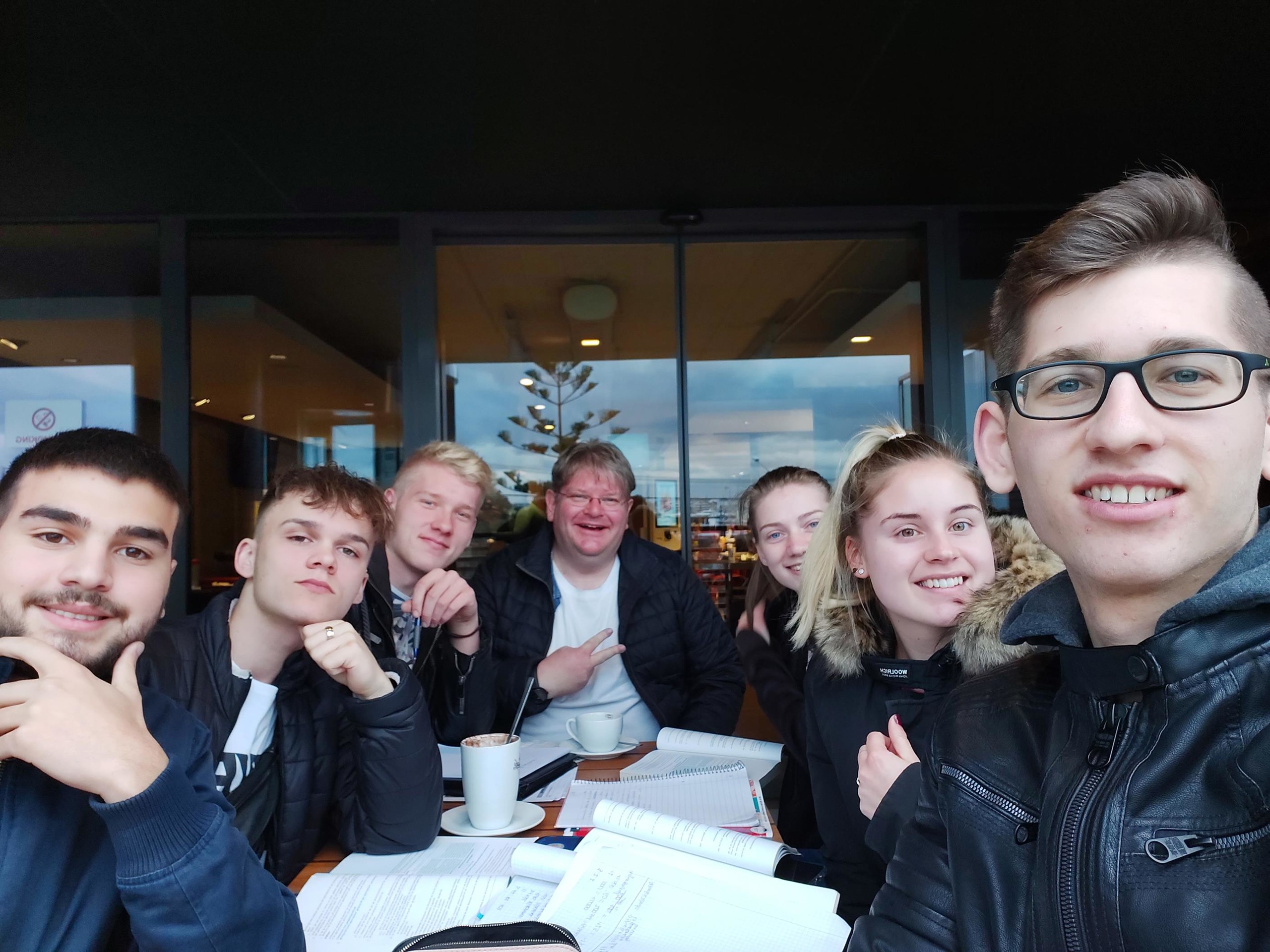
Sunday Dec 8
On 8th December it was finally time, we took our luggage and started on our trip to Frankfurt Airport with great anticipation. Already from the plane we could admire the incredibly beautiful islands of Malta. We were immediately thrilled and looked forward to a nice week in Malta.
When we arrived in Malta we received a warm welcome from a Maltese teacher and then we went to the Hotel Cerviola, where we were going to stay for the next 6 days.
First we moved into our rooms and rested for a short time. Then we decided to explore the area and headed for the Promenade with a drink in hand. After the little detour, we met the Portuguese team in the foyer of the hotel for the first time.
We got ready for dinner with the Italian, Maltese and Portuguese team in the evening.
The food in the restaurant didn't taste so good. We just had a bad restaurant since, on the other evenings, the food like e.g. hamburgers, tasted really good.
After dinner we decided to go to bed, because we were so tired from the journey.
All in all, a very nice first day in Malta.
by Marvin
Monday Dec 9
After arriving on Sunday we were all very excited for the following Monday.
After having a restful sleep and a healthy breakfast at the hotel we were ready to visit the local school. It was time to present our reseach results so all the groups held their prepared presentations about their Start-Up companies. After that we had a quick lunch provided by the school. The following school tour was very interesting due to the many vocational courses which are taught in the school.
After arriving back at the hotel we found an abandoned hotel nearby which we explored, it was called the Jerma Palace and used to be a five-star hotel.
In the evening we were free to eat by ourselves so we walked around town searching for a suitable restaurant. We went to a steak restaurant which also offered burgers and fries, we had a tasteful meal.
After taking a digesting-walk back to the hotel we fell into our beds and wondered what the week would further bring.
by Nils van Kerkom
Tuesday Dec 10
On Tuesday, we went to the Paola Active Aging Center and got an introduction by the Maltese teacher. Their local council was in the same place. We were invited inside to create a business idea.
Afterwards, we played a game and we did that to „break the ice“ between the students. The idea of the game was that every person comes up front one by one and makes a signal move and every other person imitate the signal.
After we had played the game, the Maltese students gave a presentation about how they create their business idea.
Then the mayor of the city held a welcome speech to the Erasmus participants and after he was done with his speech, they let us create our business ideas in groups. In the end every group presented their business idea.
Then we had freetime from 1pm to 5pm in town and afterwards we got picked up by the bus.
by Karahan and Tassilo
Wednesday Dec 11
On Wednesday we visited some factories near Valleta like the Mediterranean Ceramics of Malta and a company called „Valletta Glass“.
At the Mediterranean Ceramics studio we had a lecture by an employee who told us some interesting facts about the company. She also told us that most of the work starts at a sales price round about 1000 euros, but it depends on the size.
On the Valletta Glass site we had the chance to see how the glass work is made. Various figures were made from the glass, for example animal figures.
After spending some time in these start up companies we went to the historical city of Mdina.
Mdina is a very old city, built in a baroque style on top of a hill. The city is very quiet; this is why it´s also called the „Silent City“. On the platform you had a beautiful view over Malta. Only very few cars are allowed to enter the city.
After that we had some free time to explore the small town, we went to a restaurant and had lunch.
After lunch we went to Sliema by bus. In Sliema we had some free time to explore the city full of historical sights, which is therefore full of tourists. In Sliema there is a harbour where you can see many boats. There are shops where you can buy a lot of things. Also, they have restaurants and cafes, where you can sit inside or outside.
by Benita Schrammen and Natasha Muteggi
Thursday Dec 12
At 8:30 we departed from our hotel and arrived at school at 9 where we picked up the Maltese students. Twenty minutes later we reached a company called „Kordin Business Incubation Centre“. They help start-ups to create a good business idea and to set up their business plan. At 10.15 we had an interview with Mr. Ray Vella, who teaches people entrepreneurship. He offers opportunities to open a business and his company is open to anyone 24/7. Clients are able to get a bachelor and master certification.
After he had given us some information we were able to ask questions and then we had a little break and got our lunch. At 11.45 we got the certificates showing that we participated in this project and took some pictures. 15 minutes later we were on our way to Vittorosia, where we spent some free time till 13.30. Then we took a boat to Valletta where we were able to go shopping or visit churches. In the evening the whole group met at 9 o‘clock and together, we went back to the hotel.
by Alina Welke and Madeleine Schneevogt
Friday Dec 13
On Friday 13th December we had a pretty good start in the day with our breakfast-buffet at the hotel. After that we spent some time enjoying the beautiful city-life of Sliema. When we arrived, the whole Erasmus group visited a restaurant at the beach to eat some burger and pizza. We used our free-time after lunch to study a bit for the exams in the following week and for going shopping in the city centre . Some of us went to the beach of Sliema to take photos and calm down a little bit. At the end of the day we decided to have dinner with the majority of the Erasmus group. That was one of the funniest evenings of the whole week, because after some days all of the participants were much closer connected with each other than at the beginning of our meeting.
by Lukas Oberbeul
Mit Erasmus+ nach Catania
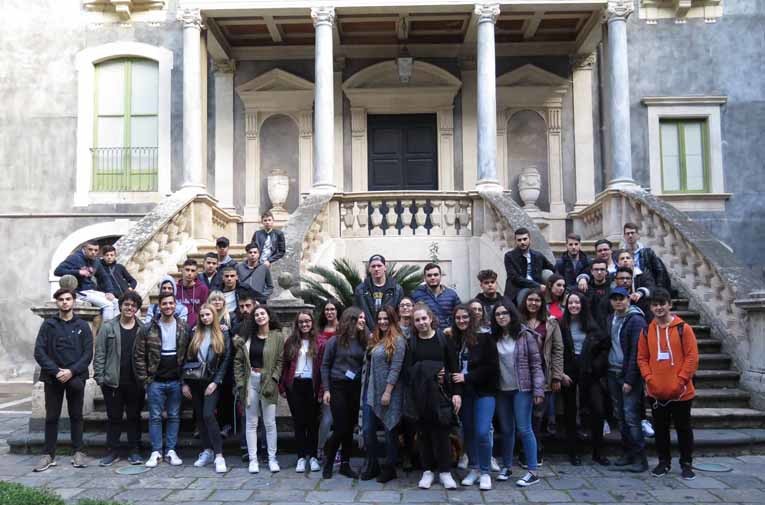
9 Dec 2018, Day of Arrival
Early in the morning, on 9 Dec 2018 the adventure began. 9 students and 3 teachers of our school flew to Sicily (Catania). All of us were excited what it would be like there. We wondered how our host families and the other students from Portugal and Malta would be.
When we reached the airport in Catania at about 10:00 am, we met our host families for the first time. Each of our group of 9 students spent the morning individually with their host families. In the late afternoon, we all met to explore the city of Catania together. We tried typical Italian food for the first time, and the first evening ended in a relaxed atmosphere in the restaurant.
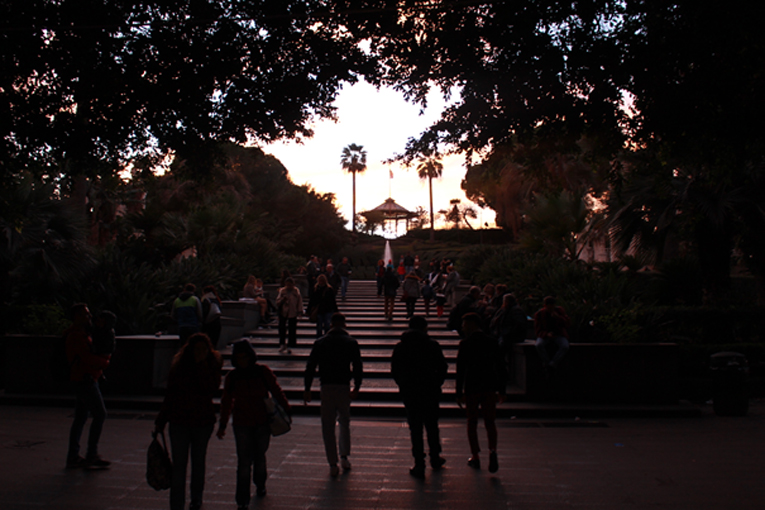
10 Dec 2018 Second Day
On our second day we went to school at 9:00 am, we were officially welcomed in Catania. We did some warm-up activities to get to know each other and had a coffee break at school. Afterwards the participating groups of students gave their presentations on the different topics. After the presentations we had lunch at school, we ate typical Italian food like Arancini (rice balls filled with ham, cheese and tomato sauce).
At 14:00 we voted for the best logos from for our project. The logo designed by the Portuguese came out best. Our German logo was second. At 15:00 we did a workshop on the Europass together with our group mates. Afterwards, when school finished, we went home to our host families and later we all met in the centre of Catania and had dinner.
by Angelina Mihajlovic and Laura La Porta
Tuesday, Dec 11
On Tuesday we visited the “CioKarrua Company” in Modica, engaged in the manufacture of chocolate. During the interesting guided tour of the company, we were told its history and saw the manufacturing process of its products.
The students had the opportunity to interview the young entrepreneur focusing the attention on the marketing strategies of his successful business. Later we went to Ortigia, a small island also known as Old City, which is the ancient centre of the city of Syracuse and contains many historical landmarks.
We had lunch there and enjoyed the magical sights and attractions of the town. We spent the evening in Catania centre with the other international project participants.
by Marvin Knispel
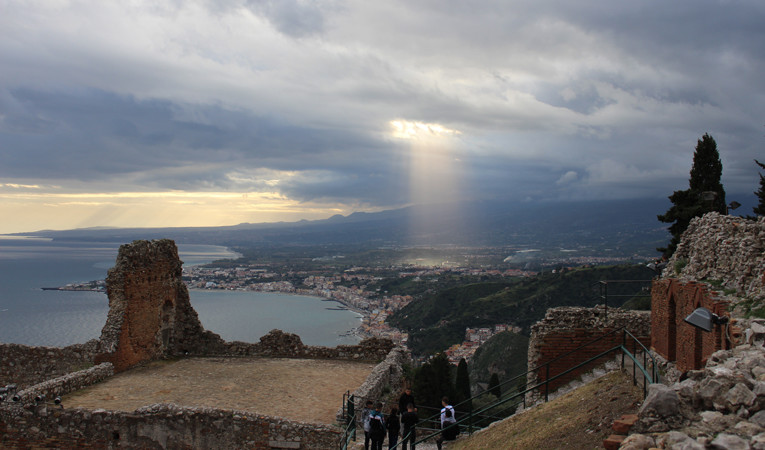
Wednesday 12th December
On Wednesday morning we all went to the school with our Italian hosts. We all were already excited to learn more about the Erasmus project and the city of Catania. At nine o‘clock we all met at school.
At school we listened to a presentation about the guidelines to write a cover letter for the Europass, presented by Ms Patrizia Riccobene. After her explanation we had to write a cover letter in groups. After the exercise we had a coffee break. We all had Italian coffee and tea with some biscuits and cake.
When everybody was finished with eating we travelled to Taormina in a private bus. The bus ride took about 2 hours. There we visited the Greek Theatre. We all discovered that not only the Greek Theatre but also the city itself was beautiful. After taking pictures of ourselves and the city we got 2 hours of free time for activities like shopping.
At 5 pm we met again and got ready for the departure to Catania. Once again this took 2 hours. When we arrived everybody went home to change clothes and refresh for a dinner at a restaurant. Some of us tried horse meat at the restaurant and some just stayed with their beloved chicken.
by Sultan-Dar Ullah and Alexander Schirger
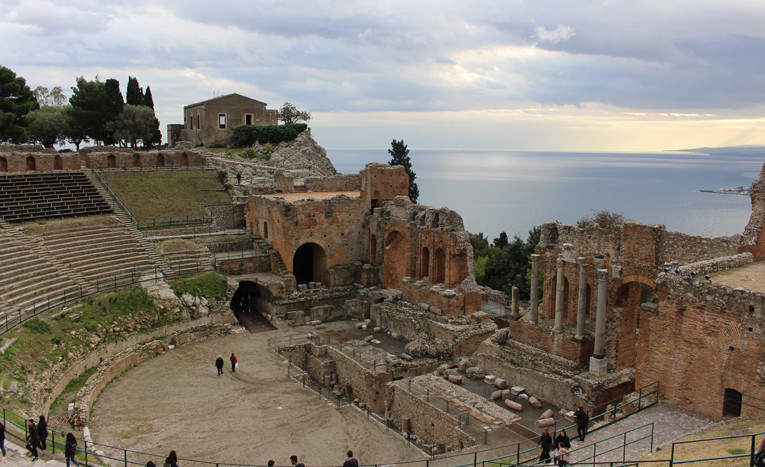
On Thursday 13th December, the whole project group met at the underground station and took a metro train to visit the University of Economics in Corso Italia. After the lesson held by the Professor Ms Nicotra, we had a training session on how to start a business in Italy. They taught us a way to open a window to the future with a business game directed by Ms Tutino.
At 1:30 p.m. we were welcomed to the radio station: „Zammù Studio“ where a few of us gave an interview on the project and how we liked our stay in Catania.
Last but not least we had a lunch at the restaurant „Catania Manganelli“ and a guided tour of the historic centre of Catania. We were led to an interesting elephant in the middle of the city centre and we got told that the elephant is the symbol of Catania.
Afterwards we enjoyed our free evening.
By Samy Benamar and Karahan Karaca
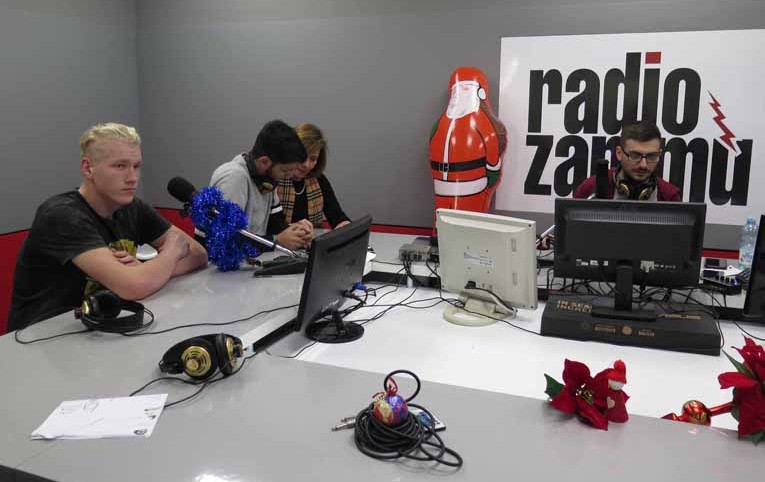
Last but not least we had a lunch at the restaurant „Catania Manganelli“ and a guided tour of the historic centre of Catania. We were led to an interesting elephant in the middle of the city centre and we got told that the elephant is the symbol of Catania.
Afterwards we enjoyed our free evening.
By Samy Benamar and Karahan Karaca
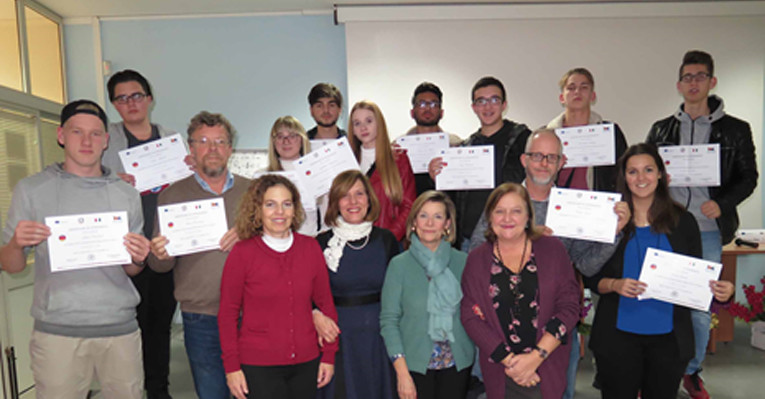
On Friday 14th December we did a couple of warm–up activities and we had a lot of group work exercises. We also had a presentation by Ms La Marca on job interviews and how to face them. She told us a lot about the most important things we need to know or have for a job interview and she also told us a couple of possible mistakes which we could avoid in a job interview.
After her presentation we got our Erasmus+ certificates of participation. For the rest of the day we had a lot of free time and we used the time to go to the city and learn more about the Italian culture and do some shopping. In the evening we had an amazing dinner with all of the programme members and the teachers. The majority of us would say that it was the best day of the week.
by Lukas Oberbeul
Kaufmännisches Berufskolleg beteiligt sich an COMENIUS

COMENIUS ist der schulbezogene Teil des EU-Programms für lebenslanges Lernen, das mit einem Budget von knapp sieben Milliarden Euro ausgestattet ist.
Bis zum Ende der Laufzeit des Programms sollen europaweit mindestens 3 Millionen Schüler an gemeinsamen Bildungsaktivitäten innerhalb von COMENIUS-Schulpartnerschaften teilgenommen haben. Die Partner arbeiten jeweils für die Dauer von zwei Jahren zu einem selbst gewählten Thema von gemeinsamem Interesse zusammen und bekommen dafür Fördermittel von der EU.
Die Projektteilnehmer des Kaufmännischen Berufskollegs arbeiten an zwei multilateralen Projekten:
C.A.R.S. (Cars are really super) rückt das Auto, seine Geschichte, seine technische Entwicklung sowie seinen Einfluss auf Kunst und Kultur in den Mittelpunkt.
Auch die Kehrseite der automobilen Gesellschaft (Staus, Unfälle, Umweltverschmutzung, Verbrauch natürlicher Ressourcen) wird - auch unter der Perspektive möglicher Auswege - beleuchtet.
Im Projekt GREEN geht es im Wesentlichen um die Erhaltung von Natur und Umwelt, den schonenden und verantwortungsvollen Umgang mit natürlichen Ressourcen. Menschen für diese Themen zu sensibilisieren und sie von der Notwendigkeit einer Verhaltensänderung zu überzeugen, sind hier vordringliche Ziele.
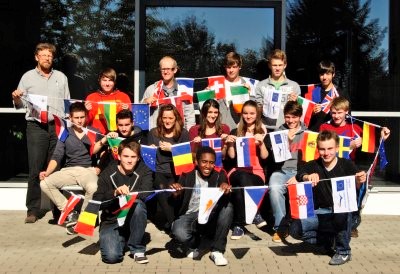
Recherche, Dokumentation und Präsentation der Ergebnisse stärken die Medienkompetenz und Kreativität der Lernenden.
Der Gebrauch der Projektsprache Englisch verbessert die Sprachkompetenz und ermöglicht interkulturelles Lernen.
Internationale Begegnungen mit anderen jungen Europäern (unsere Projektpartner kommen aus Frankreich, Italien, den Niederlanden, Rumänien, Spanien, der Türkei, Ungarn) tragen zur Verständigung bei und befördern das Zusammenwachsen Europas.
Dieses Projekt wird mit Unterstützung der Europäischen Kommission finanziert. Die Verantwortung für den Inhalt dieser Veröffentlichung trägt allein der Verfasser; die Kommission haftet nicht für die weitere Verwendung der darin enthaltenen Angaben.